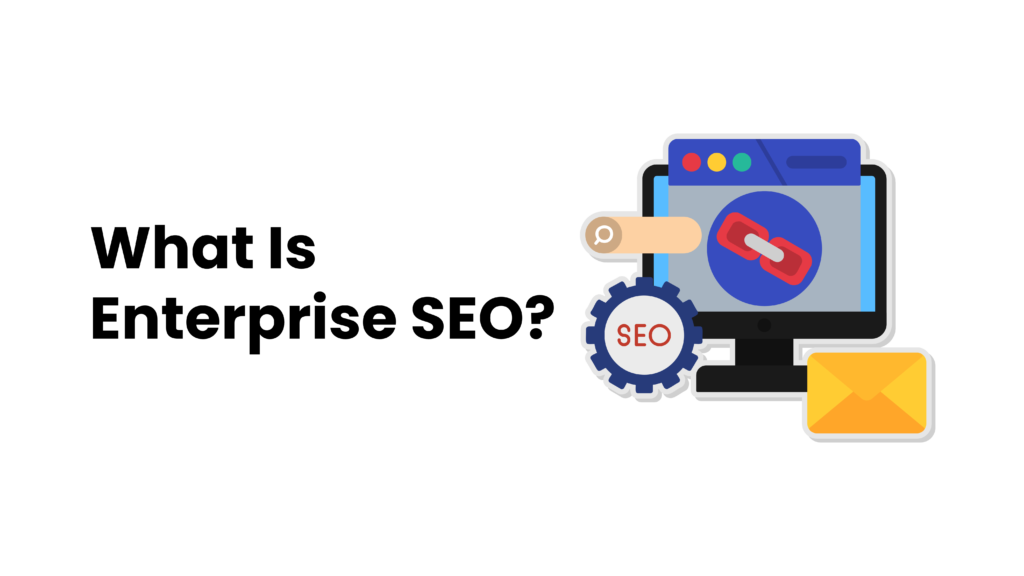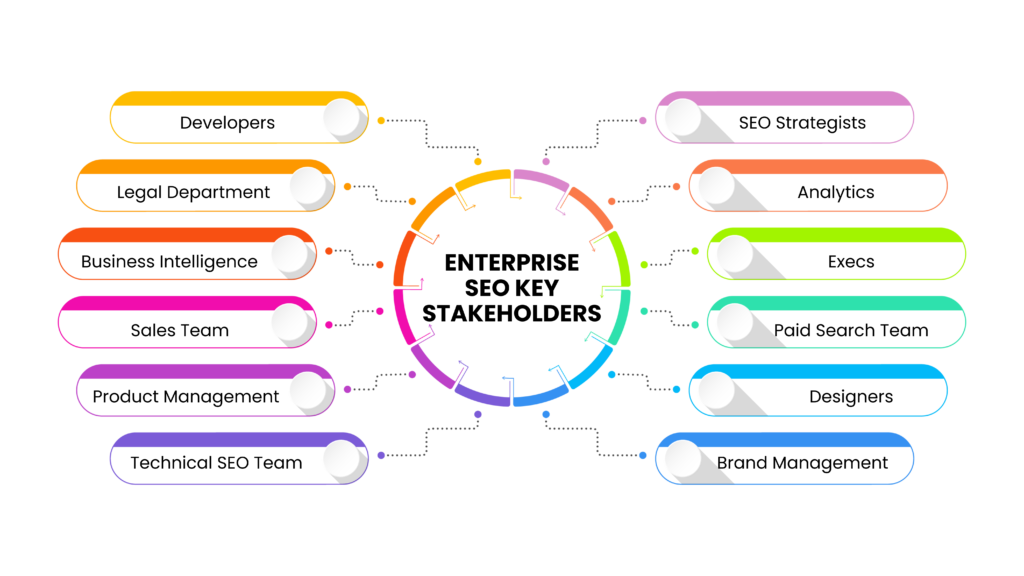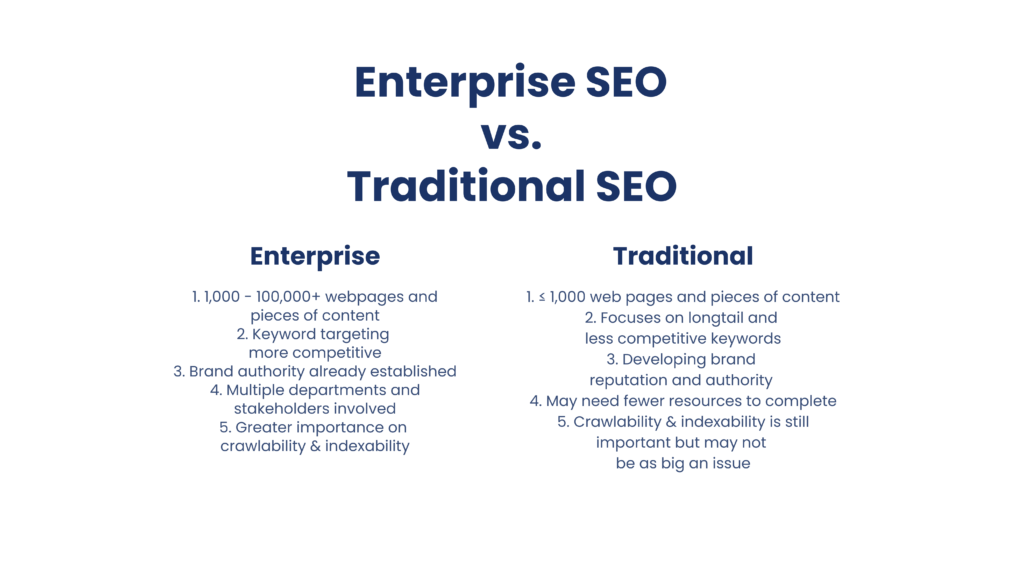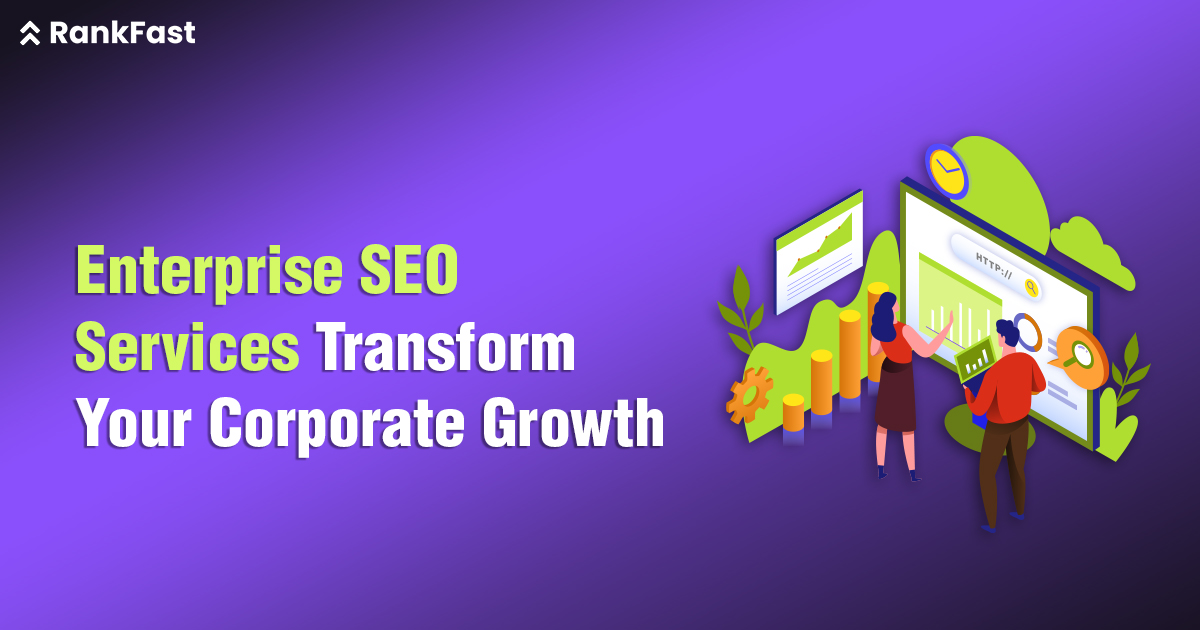Running SEO on a small business scale is one thing, but conducting SEO on the scale size of an enterprise site comprising thousands, or even millions, of pages is a different ball game altogether. Scaling issues such as redundancy, search depth, crawling speed, and internal connectivity increase exponentially. Enterprise SEO services come in at this point.
Enterprise SEO is the strategy aimed at large organizations with a complicated digital presence. It is not only about the optimization of a few landing pages but about controlling technical SEO, content, and authority-building across massive sites with multiple layers. For corporations, it will not be enough to stick to generic strategies. They require custom enterprise SEO optimization services that simplify operations, capitalize on automation, and deliver outcomes across international markets.
In this blog, we are going to dissect what enterprise SEO is, why it is essential to corporate expansion, and the advantages that can be realized by engaging an enterprise SEO agency. From technical foundations to ROI-driven approaches, you will learn how enterprise-level SEO can redefine visibility, revenue, and sustainable performance.
What is Enterprise SEO?

Traditional SEO pertains to the optimization of limited web pages that typically target small or mid-sized businesses. The process is simple: keyword research, on-page optimization, link-building, and result tracking.
Enterprise SEO, in its turn, is a totally different ball game. It is designed to serve companies that have thousands, or even millions, of indexed pages. The aim is not to optimize a few URLs but rather to develop scalable frameworks that enhance visibility across an entire digital ecosystem.
Although both methods focus on driving organic growth, enterprise SEO requires advanced technical skills, automation, and a tactical balance between global and local optimization.
The Scale Challenge of Enterprise Websites
Enterprise websites are not running dozens of landing pages; they are running tens of thousands. A 2023 Ahrefs study discovered that large e-commerce brands can easily index over 500,000 URLs. Duplicate content, crawl budget inefficiencies, and slow load speeds are issues that can have a major impact on rankings and revenue at this scale.
Controlling site architecture is also more complicated. Search engines can find it challenging to crawl and index content when it is structured into deep URL hierarchies, spread across several product categories, and built with heavy JavaScript frameworks. Even established brands may lose their search visibility without enterprise-level SEO frameworks.
Multiple Stakeholders and Approval Processes
Another challenge lies in organizational structure. An SEO recommendation could be put into practice in a week in a small business. But in an enterprise context, legal, IT, product, and regional marketing teams might all need to approve the same change.
Gartner asserts that big organizations can spend up to three times longer implementing SEO changes than SMBs. This latency makes smooth workflows and automation tools critical for enterprise SEO success.
Global vs. Local Targeting
Enterprises frequently operate across a variety of geographies. This implies their SEO approach must balance global presence with hyper-localization.
For example, a technology firm may need to rank globally as an “enterprise cloud provider” while at the same time boosting local traffic for certain services. Achieving this requires multilingual content, proper hreflang implementation, and localized link-building. Conventional SEO tactics simply do not accommodate this level of complexity.
Why Enterprises Need a Dedicated Enterprise SEO Agency
Some corporations attempt SEO in-house, but the technical complexity and scale of the task usually surpass internal capabilities. At this point, a professional partner such as RankFast comes in.
Being a specialized enterprise SEO agency, we offer experience, advanced technology, and proven processes to handle campaigns at scale. Whether it’s conducting technical audits across millions of pages, developing automated metadata strategies, or building global content frameworks, we ensure every SEO project is directly tied to corporate growth goals.
Outsourcing to experts like RankFast also provides fresh perspectives and faster implementation compared to in-house bottlenecks. According to a BrightEdge report, 68% of enterprise marketers use external SEO partners to manage at least some portion of their campaigns, with scalability and technology cited as the most important benefits. With RankFast, enterprises get both a scalable SEO framework and a technology-driven model to compete at the highest level.
Real-World Example: e-commerce at Scale
Think of a large international e-commerce company that manages millions of product descriptions across its websites. Every product page requires optimized metadata, structured data, and internal links to rank effectively. On top of this, seasonal inventory fluctuations demand constant updates to avoid outdated or broken links.
Without an enterprise SEO optimization framework, such a business would struggle with crawling and indexation. Through an experienced enterprise SEO agency, the brand can automate repetitive processes such as metadata creation, track performance across multiple markets, and stay compliant with search engine requirements. The result: stronger visibility and measurable revenue growth.
Why Enterprise SEO is Critical for Corporate Growth
For large businesses, SEO is not just a marketing channel; it is a growth engine. Enterprise SEO drives brand visibility, customer acquisition, and scalable revenue when implemented at scale. Unlike paid campaigns, which stop delivering the moment budgets are frozen, SEO creates long-term traffic and authority that compound over time.

Driving Revenue Growth at Scale
Organic search is considered one of the most powerful income streams for enterprises. According to BrightEdge, organic search drives 53% of all website traffic across industries, and for enterprise-level businesses, the share is often higher.
In a world where millions of customers are searching online, being ranked at the right place at the right time has a direct impact on revenue. Enterprise SEO ensures that thousands of products, services, and informational pages are optimized to capture demand at every funnel stage:
- Product category pages attract high-intent traffic that converts directly into sales.
- Blogs and knowledge hubs bring in decision-makers researching solutions.
- Service-specific landing pages support sales teams and build trust before outreach.
Building Brand Visibility and Authority
In highly competitive sectors like technology, finance, healthcare, and e-commerce, visibility equates to credibility. Enterprise SEO guarantees dominance across both branded and non-branded keywords, positioning the brand as a trusted leader.
Authority-building advantages include:
- Conquering SERPs by ranking for both informational and transactional queries across thousands of pages.
- Brand protection, ensuring competitors do not outrank your branded terms.
- Thought leadership, using content clusters to establish expertise in niche topics.
With Google’s E-E-A-T framework (Experience, Expertise, Authoritativeness, Trustworthiness) becoming increasingly important, enterprise SEO services directly contribute to higher trust and conversion rates.
Long-Term Organic Traffic vs. Paid Dependency
Paid advertising delivers quick visibility, but it comes at a steep cost. WordStream reports that CPC in competitive industries can exceed $50 per click. For an enterprise running thousands of campaigns, costs add up fast.
Enterprise SEO provides a sustainable alternative:
- Optimized content hubs and service pages generate evergreen traffic.
- Reduced cost of acquisition, lowering reliance on PPC.
- Scalability, as organic rankings grow and compound over time.
Rather than replacing paid ads, enterprise SEO supplements them, building a long-term traffic pipeline while easing budget pressures.
Cross-Functional Impact Beyond Marketing
Enterprise SEO extends far beyond marketing; it influences every function of the organization:
- Marketing: Supplies a consistent flow of qualified leads and strengthens brand recognition.
- Sales: Equips prospects with pre-education through optimized content, shortening the sales cycle.
- Customer Experience: Improves site speed, mobile usability, and navigation for better UX.
- Product Teams: Gains insights into customer needs and missing features via keyword research.
- Executives: SEO data informs strategic decisions around expansion, investments, and resources.
When executed effectively, enterprise SEO aligns the entire organization toward growth and visibility.
Statistics That Prove the Impact of Enterprise SEO
Research consistently shows the undeniable impact of SEO on corporate success:
- Two-thirds of all online experiences begin with a search engine (BrightEdge).
- 75% of users never scroll past the first page of results (HubSpot).
- Companies with strong organic visibility achieve 2.8x revenue growth compared to those relying on paid channels (Forrester).
- Gartner reports that enterprises investing consistently in SEO achieve 30% lower customer acquisition costs than ad-dependent rivals.
For companies with complex websites and global footprints, these numbers make one thing clear: enterprise SEO is not optional; it’s necessary.
Core Pillars of Enterprise SEO Optimization Services

Enterprise SEO is not a one-size-fits-all solution. Managing websites with tens of thousands, or even millions, of pages is too complex to operate without a strong foundation. These pillars are crucial for visibility, scalability, and revenue growth.
Let’s break down the five core pillars of enterprise SEO optimization services.
a. Technical SEO for Large-Scale Websites
Technical SEO forms the backbone of enterprise SEO services. At scale, even small issues can lead to significant losses in traffic and revenue.
- Page Responsiveness and Accessibility
Google reports that even a 1-second delay in load time can reduce conversions by 20%. For enterprise sites with thousands of pages, slow load times frustrate users and reduce search efficiency. Techniques like reducing server response times, using CDNs, and compressing assets ensure fast-loading and fully indexable pages. - Depth of Crawl and Duplicate Content
Enterprise websites with deep URL hierarchies often leave valuable content unseen by crawlers. Duplicate content from product variations or faceted navigation further weakens rankings. Solutions include canonical tags, optimized sitemaps, and structured URL hierarchies to improve crawl efficiency and eliminate duplication. - Handling JavaScript-Heavy Websites
Frameworks like React and Angular provide engaging experiences but complicate indexing. Without enterprise-level SEO frameworks, content risks going unseen. Server-side rendering (SSR) and dynamic rendering are critical to ensuring crawlers access complete content. - Structured Data and Schema at Scale
Schema markup helps search engines interpret content and deliver rich snippets. At enterprise scale, automation is essential; structured data and metadata must be templated and deployed via CMS systems to maintain consistency across thousands of pages.
b. Content Strategy & Optimization
Enterprise SEO optimization services succeed when backed by a scalable content strategy. Random updates won’t work; content operations must be structured and data-driven.
- Optimizing Thousands of Pages
Unlike small businesses that manually optimize 20 pages, enterprises must optimize 100,000+ pages. Scalable workflows automate meta descriptions, title tags, and product page templates, often integrated directly with enterprise CMS systems. - Developing Pillars and Content Hubs
Search engines reward depth and authority. Enterprises build content hubs, pillar pages supported by related resources. For example, a SaaS provider might create a main “Enterprise Cloud Security” page, supported by subtopics on compliance, integrations, and case studies. - Enterprise Keyword Research Strategies
Keyword research must cover head terms, long-tail queries, and global variations.- High-volume head terms drive visibility (e.g., enterprise SEO services).
- Long-tail searches capture high-conversion traffic (e.g., best enterprise SEO agency for e-commerce).
- Global keywords support localization with hreflang and multilingual strategies.
Agencies use advanced tools like Ahrefs, SEMrush, and BrightEdge to analyze millions of keyword variations and align them to every stage of the funnel.
c. On-Page Optimization at Scale
Rankings depend on on-page SEO, but at the enterprise level, processes must be automated and standardized.
- Metadata Automation
Manually writing metadata for 100,000+ pages are impossible. Automation generates dynamic title tags and meta descriptions based on CMS data, ensuring relevance and keyword integration. - Internal Linking Strategy
Internal linking distributes authority and guides crawlers. At scale, automation helps:- Connect related product or content pages.
- Create breadcrumb trails for navigation.
- Maintain consistent anchor text across thousands of URLs.
- Enterprise CMS Challenges
Platforms like Sitecore, Adobe Experience Manager, or custom CMS solutions complicate SEO changes. Enterprise SEO services must adapt recommendations without disrupting operations, ensuring implementation efficiency.
d. Authority Building & Link Acquisition
Authority remains one of the strongest enterprise SEO ranking factors. Unlike SMBs, enterprises require advanced link acquisition strategies.
- Why Link-Building is Harder for Enterprises
Local directory links or guest posts are insufficient. Enterprise link-building aligns with brand reputation, PR campaigns, and authoritative partnerships. - PR-Driven Link-Building
Multinationals often release newsworthy content, reports, partnerships, or product launches. Leveraging these for digital PR earns high-authority backlinks. Example: a tech brand publishing an annual State of Cloud Security Report secures coverage from top industry outlets. - Local and Global Backlink Mix
Enterprises must balance global authority with local relevance by:- Securing links from global industry leaders.
- Building local backlinks to boost regional rankings.
- Partnering with influencers, associations, and local publications.
According to Moz, top-ranking pages earn 3.8x more backlinks than competitors, showing that sustained authority building is non-negotiable.
e. Automation & AI in Enterprise SEO
Manual processes cannot keep pace with enterprise demands. Automation and AI are essential for scaling SEO.
- Automated Workflows
Tools like Screaming Frog, Botify, and DeepCrawl audit millions of URLs, flag issues, and monitor performance. Enterprise CMS integrations push metadata updates in real time. - AI-Powered Optimization and Reporting
Machine learning tools analyze search intent, recommend content improvements, and generate outlines at scale. AI-powered dashboards deliver executives real-time insights on traffic, revenue impact, and ROI.
A 2024 Search Engine Journal survey revealed that 42% of enterprise marketers already leverage AI tools in SEO, reporting significant gains in efficiency and performance.
The Role of an Enterprise SEO Agency

In large organizations, SEO is no longer about optimizing a few pages or creating backlinks. Enterprises often struggle to manage SEO internally due to thousands of URLs, multiple markets, and constantly evolving algorithms. This is why most companies partner with a specialized enterprise SEO agency, a team with the knowledge, tools, and processes to manage SEO at scale.
An enterprise SEO agency offers more than tactical implementation. It provides a structured framework that aligns SEO activities with business objectives. For example, agencies conduct extensive technical audits to identify issues such as crawl inefficiencies, duplicate content, or site speed bottlenecks. Backlinko reports that improving technical performance can increase organic traffic by up to 35%, even at enterprise scale. These audits allow companies to address problems affecting tens of thousands of pages, which would otherwise go unnoticed.
Beyond technical health, agencies lead the creation of enterprise-specific content strategies. This includes content architecture, optimizing category and service pages, and developing thought leadership materials that maintain both international and local visibility. Since 68% of all online experiences begin with a search engine (BrightEdge), a well-executed content strategy directly drives business growth at every stage of the funnel.
Multinational enterprises also require global SEO management. Agencies ensure websites are optimized for multiple languages, regions, and cultures. HubSpot reports that 70% of users prefer content in their native language, making localization a revenue driver. Agencies use hreflang tags, regional keyword strategies, and local search optimizations while maintaining global brand consistency.
Executive-level reporting is another critical agency function. Companies need more than simple ranking updates; they require dashboards linking SEO outcomes to revenue, conversions, and brand growth. Gartner found that enterprises using advanced SEO reporting achieve 27% faster marketing ROI. Agencies consolidate data from multiple tools into unified dashboards, helping marketing, sales, and leadership teams evaluate performance effectively.
The advantages of partnering with an enterprise SEO agency over in-house teams are clear. Internal teams may face bandwidth issues, conflicting priorities, or lack access to advanced tools. Agencies provide scalability, expertise, and technology. Conductor reports that 60% of enterprise marketers cite resource shortages as their biggest SEO challenge, which agencies address by delivering specialized knowledge and enterprise-grade tools.
Scalability is perhaps the most significant advantage of working with an enterprise SEO agency. Whether deploying metadata updates across 50,000 product pages, executing link-building campaigns in multiple regions, or managing technical fixes on complex CMS platforms, agencies handle these challenges efficiently. Their cross-functional expertise allows seamless coordination between IT, content, and marketing teams, ensuring timely project completion.
Enterprise SEO vs. Traditional SEO Agencies

While both traditional SEO agencies and enterprise SEO agencies aim to improve visibility, their methods differ significantly in scale, technology, reporting, and management complexity.
Small to mid-sized businesses (20–500 pages) are typically served by traditional SEO agencies. Plans are mostly manual, personalized, and focused on local or niche visibility. In contrast, enterprise SEO agencies are built to scale, optimizing tens of thousands of pages, managing global campaigns, and providing ROI-driven reporting tied directly to corporate growth.
BrightEdge reports that 68% of large organizations partner with specialized SEO agencies because conventional models cannot meet enterprise-scale challenges.
Key Differences Between Traditional and Enterprise SEO Agencies
| Factor | Traditional SEO Agencies | Enterprise SEO Agencies |
|---|---|---|
| Scale of Operations | 20–500 pages, local/regional focus | 10,000–1M+ pages, national/global campaigns |
| Tools & Automation | Basic SEO tools, limited automation | Enterprise-grade tools (Botify, BrightEdge, DeepCrawl), heavy automation |
| Reporting Needs | Simple ranking and traffic reports | Executive dashboards linking SEO to revenue, conversions, ROI |
| Stakeholder Management | Few decision-makers, faster approvals | Multiple stakeholders (IT, legal, product, marketing), longer cycles |
A Gartner study shows that enterprise SEO implementations take 3x longer due to multi-stakeholder approvals, making agency expertise essential.
Forrester reports that companies linking SEO to business KPIs achieve 2.8x higher revenue growth.
For large corporations, the enterprise approach is not just better, it is essential for sustained growth.
How Enterprise SEO Services Drive ROI
Enterprise SEO services go beyond rankings; they deliver measurable business outcomes. For corporations managing large-scale websites, ROI comes from more traffic, higher conversion rates, and long-term revenue growth. These services tie SEO metrics directly to the bottom line.
Measuring Beyond Rankings
Unlike traditional SEO, which focuses on keyword positions, enterprise SEO measures success through:
- Organic sessions
- Quality of leads
- Conversion-driven metrics impacting revenue
Forrester notes that companies linking SEO to revenue KPIs are 2.8x more likely to achieve above-average growth. Executive dashboards allow stakeholders to track the financial impact of each optimization.
Case Studies: E-commerce & SaaS
- E-commerce: Optimizing hundreds of thousands of product pages can significantly boost ROI. One global retailer optimized 200,000+ product pages and achieved a 40% increase in organic revenue within a year through systematized metadata and structured data.
- SaaS businesses: Content strategies targeting head terms and long-tail searches, supported by content hubs, drive inbound leads while reducing reliance on paid acquisition.
Role of Attribution Models
Multi-touch attribution is critical to demonstrate ROI in enterprise SEO. The customer journey involves multiple touchpoints, organic search, paid campaigns, email, and referral traffic. Enterprise SEO agencies use attribution models to show how organic visibility supports marketing, sales, and customer experience, helping stakeholders understand the value of SEO across the entire business.
How to Choose the Right Enterprise SEO Agency
Choosing the right enterprise SEO agency is a high-stakes decision. The right partner can unlock long-term organic growth, while the wrong one can waste time, budgets, and opportunities. Here’s a systematic guide on how businesses should evaluate agencies, and what pitfalls to avoid.
Industry Expertise Matters
Not all SEO agencies understand the nuances of enterprise-level SEO. A firm experienced in your industry can navigate regulatory challenges, product complexities, and international expansion goals. For instance, e-commerce enterprise SEO demands expertise in managing millions of product pages, while SaaS SEO focuses on content hubs and lead generation. Agencies like RankFast create industry-specific strategies to align campaigns with business objectives.
Technical Proficiency at Scale
Enterprise websites may have 10,000+ pages, requiring advanced technical SEO skills. Agencies must handle crawl depth management, duplicate content remediation, and structured data across thousands of pages. Proficiency in enterprise-grade tools such as Botify, DeepCrawl, or BrightEdge, along with automation capabilities, is essential for implementing large-scale changes efficiently.
Open Reporting and Communication
Enterprises need more than basic ranking updates. Executive-level dashboards that connect SEO activities to KPIs like conversions, pipeline growth, and revenue are critical. Gartner reports that 72% of marketing leaders expect profit-oriented SEO reporting from agencies. The right partner will provide full transparency with actionable insights, not just vanity metrics.
Balancing Global and Local SEO
International enterprises require cross-geographic, multilingual, and multi-market SEO strategies. At the same time, local search visibility for branch offices, franchises, or service pages cannot be ignored. Agencies should have experience with multi-language SEO, hreflang implementation, and local listings. Firms like RankFast deliver international frameworks while maintaining local precision, giving brands an edge in both global and hyperlocal markets.
Case Studies & Client References
A credible agency supports its claims with evidence. Review case studies demonstrating measurable outcomes, whether higher revenue, increased traffic, or improved rankings. Speaking to past or current clients can validate credibility and responsiveness. Generic or unclear case studies are a warning sign.
Common Hiring Mistakes
- Selecting solely by cost: Low-priced agencies may lack the expertise or technology to handle enterprise-level SEO.
- Underestimating scalability: Processes effective for mid-sized sites may fail for million-page domains. Ensure the agency can scale.
- Ignoring cultural fit: SEO requires cross-team collaboration with IT, product, and marketing. Misaligned communication styles can hinder performance.
- Not requesting reporting samples: Without proof of ROI, long-term enterprise SEO investments carry unnecessary risk.
Future of Enterprise SEO
Enterprise SEO evolves rapidly, influenced by technology and user behavior. For companies managing millions of pages, success requires anticipating trends rather than just following them.
AI-Driven Enterprise SEO
AI is transforming enterprise SEO. From AI-driven keyword clustering to automated content optimization, businesses can process vast amounts of data faster than human teams. Machine learning tools help agencies identify ranking opportunities, forecast traffic changes, and deliver personalized recommendations at scale. Proper AI implementation reduces manual tasks while creating competitive advantages.
Voice Search and Conversational Queries
By 2026, voice search is expected to account for over half of all search queries (Juniper Research). Enterprises must optimize for conversational queries, natural language, FAQs, long-tail keywords, and localized content to capture voice-driven traffic.
Large Websites and Algorithm Updates
Google’s focus on E-E-A-T (Experience, Expertise, Authoritativeness, Trustworthiness) and page experience impacts large sites significantly. Even minor issues such as thin or duplicate content can have large-scale consequences. Proactive technical audits and agile processes are essential to maintain visibility during algorithm updates.
Hyper-Local and Personalized SEO
Personalization is the next frontier in enterprise SEO. Consumers now expect content, offers, and search results tailored to both intent and location. Global brands must implement hyper-local strategies, ensuring search results in New York differ from those in London. Data-driven segmentation and geo-specific optimization will become increasingly critical for enterprise SEO agencies.
Conclusion
Enterprise SEO differs vastly from traditional SEO. With tens of thousands of pages, multiple stakeholders, and global markets, enterprises need specialized strategies for technical audits, content development, and authority-building at scale.
Enterprise SEO optimization services directly influence revenue growth, brand authority, and long-term traffic sustainability. Leveraging automation, advanced tools, and strategic frameworks, these services reduce reliance on paid advertising while establishing a scalable digital presence.
Partnering with a specialist enterprise SEO agency ensures expertise, industry-specific experience, and enterprise-level reporting. This guarantees that SEO delivers measurable business results, not just rankings.
For companies ready to evaluate their current SEO performance and unlock growth opportunities, collaborating with the right enterprise SEO agency is the next step. RankFast collaborates with large corporations to tackle complex SEO challenges, providing scalable and results-driven solutions. Align your SEO strategy with corporate growth, partner with RankFast, and experience the difference.
FAQ
1. What makes enterprise SEO different from traditional SEO?
Enterprise SEO focuses on scaling strategies for websites with tens of thousands to millions of pages. It requires advanced automation, technical audits, and stakeholder management, whereas traditional SEO usually caters to smaller sites with manual tactics.
2. How long does it take to see results from enterprise SEO?
Enterprise SEO typically shows measurable improvements in 4–6 months, depending on the complexity of the website and industry competition. Since changes often roll out at scale, results compound over time, driving long-term growth.
3. Why should enterprises hire an SEO agency instead of relying on in-house teams?
In-house teams may lack the bandwidth or specialized tools needed for large-scale SEO. Partnering with an enterprise SEO agency brings advanced technology, automation, and proven frameworks to manage growth more effectively.
4. How does enterprise SEO impact revenue growth?
By optimizing thousands of pages, improving visibility, and capturing high-intent searches, enterprise SEO drives more qualified traffic. This translates into higher conversions and measurable revenue impact over time.
5. Can enterprise SEO help global companies with multiple markets?
Yes. Enterprise SEO strategies include multi-language SEO, hreflang implementation, and local optimization to ensure visibility across different countries while maintaining local relevance.
6. How do agencies measure ROI from enterprise SEO?
Agencies track metrics beyond rankings, such as organic traffic growth, conversions, and revenue attribution. Advanced reporting dashboards show how SEO contributes directly to business KPIs.
7. Why choose RankFast for enterprise SEO?
RankFast specializes in enterprise SEO optimization services, offering technical expertise, global SEO management, and ROI-driven reporting. Their strategies are designed to help corporations scale visibility and accelerate growth.

Leave a Reply